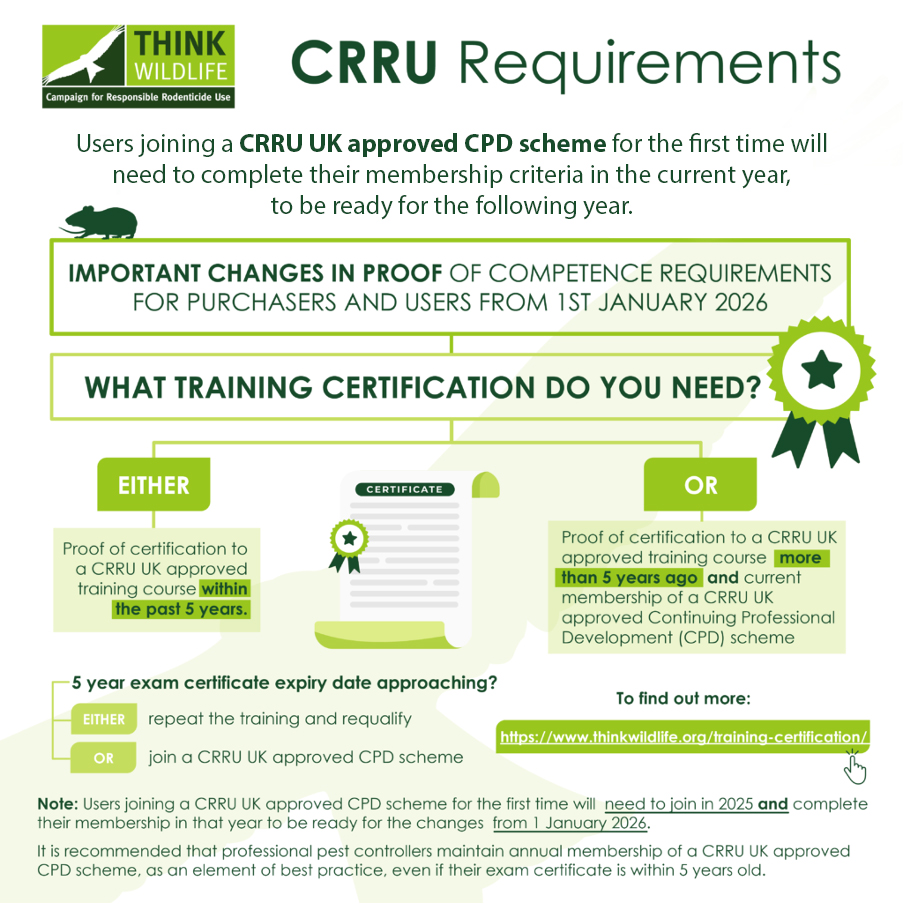
Training & Certification
CRRU UKPurpose
- Establish a framework for the review and approval of training courses and their certification HERE.
- Define minimum standards for the achievement of certified proof of competence.
- Commission a panel of qualification providers.
- Review available training courses (existing and new) for compliance with framework requirements and publish updated lists of those approved HERE.
- Set out compliance guidelines for schemes of continuing professional development (CPD)
Work Group Members
Training & Certification
Matthew Davies | CRRU T&C WG lead
Nigel Cheeseright | CRRU Chair
Nic Blaszkowicz | Pelgar
Aaron Mansfield | RSPH
Karen Dawes | BPCA
Glynn Evans | BASC
David Fisher | Lantra
Martin Glenn | Trainer
Kevin Lawrenson | NPTA
Harry Henderson | BASIS Reg Ltd
Jackie Hough | City & Guilds NPTC
Alison Warrington | NFU England
David Michie | NFU Scotland
Sophie Thorogood | Pelsis
IMPORTANT CHANGES TO PROOF OF COMPETENCE REQUIREMENTS FOR PURCHASERS AND USERS OF PROFESSIONAL USE RODENTICIDES FROM 1ST JANUARY 2026
As part of measures taken to strengthen stewardship, CRRU UK has decided that from 1st January 2026 the following two options will be the only criteria at the point of sale which sellers of professional use rodenticides will consider as proof of competence for the purchase and subsequent use of professional use rodenticides in the UK.
Either :
Proof of certification to a CRRU UK approved training course within the past 5 years (https://www.thinkwildlife.org/training-certification/)
Or :
Proof of certification to a CRRU UK approved training course more than 5 years ago and current membership of a CRRU UK approved Continuing Professional Development (CPD) scheme. https://www.thinkwildlife.org/training-certification/continuing-professional-development-cpd-and-stewardship/
Note: Users joining a CRRU UK approved CPD scheme for the first time will need to complete their membership criteria in the current year, to be ready for the following year.
CRRU UK – approved CPD schemes
Training Certification Continuing Professional Development CPD and Stewardship
Basis Prompt https://basis-prompt.co.uk/
BPCA Registered https://bpca.org.uk/registered
British Pest Register https://cpd.pest-register.co.uk/login.php
(CRRU UK approved CPD schemes feature 3 points / hours / credits, of rodent control content that conforms to CRRU guidelines, required each year as part of the normal quota for membership. This is to be assessed as part of the event.)

Farmers
Q1: I hold membership of a Farm Assurance Scheme (CRRU UK approved)?
A1: Membership of Farm Assurance Schemes will not be accepted at the point of sale for the purchase of professional-use rodenticides, from 1st January 2026.
You will need either:
1. Proof of certification to a CRRU UK approved training course within the past 5 years (https://www.thinkwildlife.org/training-certification/
Or :
2. Proof of certification to a CRRU UK approved training course more than 5 years ago and current membership of a CRRU UK approved Continuing Professional Development (CPD) scheme https://www.thinkwildlife.org/training-certification/continuing-professional-development-cpd-and-stewardship/
Q2: I am a farmer with training and certification listed here
https://www.thinkwildlife.org/training-certification/
A2a: Check the date on your certificate – if it is within the past 5 years you will be able to purchase and use professional-use rodenticides at that point. (Remember to check your certificate date at regular intervals to ensure that it is no older than 5 years to-date).
A2b: Check the date on your certificate – if it is not within the past 5 years you will not be able to purchase and use professional-use rodenticides. You will need either:
You will need either:
1. Proof of certification to a CRRU UK approved training course within the past 5 years (https://www.thinkwildlife.org/training-certification/
Or :
2. Proof of certification to a CRRU UK approved training course more than 5 years ago and current membership of a CRRU UK approved Continuing Professional Development (CPD) scheme https://www.thinkwildlife.org/training-certification/continuing-professional-development-cpd-and-stewardship/
Q3: Which CPD schemes are CRRU UK approved?
A3: CRRU UK approved CPD schemes are listed here: https://www.thinkwildlife.org/training-certification/continuing-professional-development-cpd-and-stewardship/
Q4: If I choose the CPD route, when do I need to join a CRRU UK approved CPD scheme?
A4: Users joining a CRRU UK approved CPD scheme for the first time will need to complete their membership criteria in the current year, to be ready for the following year.
Q5: What will the 3 points / hours / credits of rodent control content that conforms to CRRU guidelines look like? (Required each year as part of the normal quota for membership. This is to be assessed as part of the event)
A5: CRRU UK support delivery of CPD by producing learning resources available to CRRU UK approved CPD schemes, for dissemination via their established routes to users. The expertise of CRRU UK member companies, stakeholder organisations, and individuals have been harnessed to create a series of CPD training modules made freely available at the CRRU UK website (https://www.thinkwildlife.org/training-certification/continuing-professional-development-cpd-and-stewardship/). The modules, each comprising a PowerPoint presentation taking 45-60 minutes for completion, are supported by detailed trainers’ notes. The resources are downloaded by training organisations and used during face-to-face or online education events.
Q6: Do I need to collect the 3 points from attending 3 different talks?
A6: Ideally yes but this is not a requirement. Most users will proactively seek out different talks naturally. Events will typically vary their topics. Some events will feature 3 different talks all together. There is a chance, although rather unlikely, that a user may attend the same talk e.g. Environmental Risk Assessments 3 times and gain 3 points for the same information. It is trusted that users will be proactive enough to seek out the various CRRU UK updates at different events and that events through the year will naturally vary their content.
Q7: If I choose the training and certification route, when should I take the training and exam?
A7: Course availability and processing times for exam results vary. Ensure you have enough time to access a course, undertake the training, and take the exam. Also factor in time needed for results to be processed and certificates produced with potential for exam re-sits also considered.
Gamekeepers
Q1: I am a gamekeeper with training and certification listed here https://www.thinkwildlife.org/training-certification/. What do I need to do?
A1a: Check the date on your certificate – if it is within the past 5 years you will be able to purchase and use professional use rodenticides at that point. (Remember to check your certificate date at regular intervals, to ensure that it is no older than 5 years to-date).
A1b: Check the date on your certificate – if it is not within the past 5 years you will not be able to purchase and use professional use rodenticides. You will need either:
- Proof of certification to a CRRU UK approved training course within the past 5 years (https://www.thinkwildlife.org/training-certification/)
- Or:
- Proof of certification to a CRRU UK approved training course more than 5 years ago and current membership of a CRRU UK approved Continuing Professional Development (CPD) scheme https://www.thinkwildlife.org/training-certification/continuing-professional-development-cpd-and-stewardship/
Q2: Which CPD schemes are CRRU UK approved?
A2: CRRU UK approved CPD schemes are listed here: https://www.thinkwildlife.org/training-certification/continuing-professional-development-cpd-and-stewardship/
Q3: If I choose the CPD route, when do I need to join a CRRU UK approved CPD scheme?
A3: Users joining a CRRU UK approved CPD scheme for the first time will need to complete their membership criteria in the current year, to be ready for the following year.
Q4: What will the 3 points / hours / credits, of rodent control content that conforms to CRRU guidelines look like? (Required each year as part of the normal quota for membership. This is to be assessed as part of the event)
A4: CRRU UK support delivery of CPD by producing learning resources that are available to CRRU UK approved CPD schemes, for dissemination via their established routes to users. The expertise of CRRU UK member companies, stakeholder organisations and individuals have been harnessed to create a series of CPD training modules made freely available at the CRRU UK website (https://www.thinkwildlife.org/training-certification/continuing-professional-development-cpd-and-stewardship/). The modules, each comprising a PowerPoint presentation taking 45-60 minutes for completion, are supported by detailed trainers’ notes. The resources are downloaded by training organisations and used during face-to-face or online education events.
Q5: Do I need to collect the 3 points from attending 3 different talks?
A5: Ideally yes but this is not a requirement. Most users will proactively seek out different talks naturally. Events will typically vary their topics. Some events will feature 3 different talks all together. There is a chance, although rather unlikely, that a user may attend the same talk e.g. Environmental Risk Assessments 3 times and gain 3 points for the same information. It is trusted that users will be proactive enough to seek out the various CRRU UK updates at different events and that events through the year will naturally vary their content.
Q6: If I choose the training and certification route, when should I take the training and exam?
A6: Course availability and processing times for exam results vary. Ensure you have enough time to access a course, undertake the training and take the exam. Also factor in time needed for results to be processed and certificates produced with potential for exam re-sits also considered.
Q1: I am a professional pest controller with training and certification listed here https://www.thinkwildlife.org/training-certification/ and I already maintain current membership of a CRRU UK approved CPD scheme https://www.thinkwildlife.org/training-certification/continuing-professional-development-cpd-and-stewardship/. What do I need do?
A1: Congratulations, you are a standard-bearer for stewardship! You meet the CRRU requirements, with no further action required. Continuing this approach will help ensure ongoing compliance with these requirements. Thank you for your support of stewardship.
Q2: I am a professional pest controller with training and certification listed here https://www.thinkwildlife.org/training-certification/. What do I need to do?
A2a: Check the date on your exam certificate – if it is within the past 5 years you will be able to purchase and use professional use rodenticides at that point. (Remember to check your exam certificate date at regular intervals, to ensure that it is no older than 5 years to-date).
A2b: Check the date on your exam certificate – if it is not within the past 5 years you will not be able to purchase and use professional use rodenticides. You will need either:
Proof of certification to a CRRU UK approved training course within the past 5 years (https://www.thinkwildlife.org/training-certification/)
Or:
Proof of certification to a CRRU UK approved training course more than 5 years ago and as recommended retain current membership of a CRRU UK approved Continuing Professional Development (CPD) scheme https://www.thinkwildlife.org/training-certification/continuing-professional-development-cpd-and-stewardship/
Q3: Which CPD schemes are CRRU UK approved?
A3: CRRU UK approved CPD schemes are listed here: https://www.thinkwildlife.org/training-certification/continuing-professional-development-cpd-and-stewardship/
Q4: If I choose the CPD route, when do I need to join a CRRU UK approved scheme?
A4: Users joining a CRRU UK approved CPD scheme for the first time will need to complete their membership criteria in the current year, to be ready for the following year.
Q5: What will the 3 points / hours / credits, of rodent control content that conforms to CRRU guidelines look like? (Required each year as part of the normal quota for membership. This is to be assessed as part of the event)
A5: CRRU UK support delivery of CPD by producing learning resources that are available to CRRU UK approved CPD schemes, for dissemination via their established routes to users. The expertise of CRRU UK member companies, stakeholder organisations and individuals have been harnessed to create a series of CPD training modules made freely available at the CRRU UK website (http://www.thinkwildlife.org/training-certification/continuing-professional-development-cpd-and-stewardship). The modules, each comprising a PowerPoint presentation taking 45-60 minutes for completion, are supported by detailed trainers’ notes. The resources are downloaded by training organisations and used during face-to-face or online education events.
Q6: Do I need to collect the 3 points from attending 3 different talks?
A6: Ideally yes but this is not a requirement. Most users will proactively seek out different talks naturally. Events will typically vary their topics. Some events will feature 3 different talks all together. There is a chance, although rather unlikely, that a user may attend the same talk e.g. Environmental Risk Assessments 3 times and gain 3 points for the same information. It is trusted that users will be proactive enough to seek out the various CRRU UK updates at different events and that events through the year will naturally vary their content.
Q7: If I am not part of a current CRRU UK approved CPD scheme and my certificate is older than 5 years, when should I take the training and exam?
A7: Course availability and processing times for exam results vary. Ensure you have enough time to access a course, undertake the training and take the exam. Also factor in time needed for results to be processed and certificates produced with potential for exam re-sits also considered. Once passed it is recommended that professional pest controllers maintain annual membership of a CRRU UK approved CPD scheme, as an element of best practice.
Advice for professional pest controllers:
Professional pest controllers are often involved in continuous and daily use of rodenticides across multiple client sites. For this reason, it is recommended that professional pest controllers maintain annual membership of a CRRU UK approved CPD scheme, as an element of best practice, even if their exam certificate is within 5 years old.
Maintaining annual membership of a CRRU UK approved CPD scheme is likely to future-proof professional users for any further stewardship strengthening measures.
Note that the requirements being brought in for 2026 are the minimum standards needed to purchase and use professional rodenticides under stewardship, as a starting point for professional users. Further development and progression in training, including practical experience, is a responsible approach.
|
Current certification
|
|
|---|---|
| Current certification: | Certificate ‘valid from’ year, for 1st January 2026 requirements (unless CRRU UK CPD in place) |
| RSPH/BPCA Level 2 Award in Pest Management (2010 onwards) | 2021 |
| RSPH/BPCA Level 2 Certificate in Pest Management (2010 onwards) | 2021 |
| City & Guilds NPTC Level 2 Award in the Safe Use of Pesticides for Vertebrate Pest Control for Rats and Mice (QCF) (PA-R&M) (2013 onwards) | 2021 |
| Lantra Awards Level 2 Award in Rodent Management (2022-onwards) | 2021 |
| Open Awards Level 2 Award in the Principles of Rodent Control (2023-onwards) | 2021 |
| RSPH Level 2 Award in the safe use of rodenticides (2015 onwards) | 2021 |
| BPCA Using Rodenticides Safely (Exam through Lantra) (2023-onwards) | 2021 |
| Open Awards Level 2 Award in Rodent Control for Gamekeepers and Rural Environments (2023-onwards) | 2021 |
|
Grandfather certification
|
|
|---|---|
| Grandfather certification | Certificate ‘valid from’ year, for 1st January 2026 requirements (unless CRRU UK CPD in place) |
| Killgerm Principles of Rodent Control (2016 – January 2023, through BASIS) | 2021 |
| Rat Control for Gamekeepers (2015 – January 2023, through BASIS) | 2021 |
| BPCA Using Rodenticides Safely (2015 – January 2023, through BASIS) | 2021 |
| RSPH Level 3 Diploma in Pest Management (2010 – 2016) | CPD |
| RSPH/BPCA Level 2 Certificate in Pest Control (2004 – 2010*) | CPD |
| RSPH Level 2 Certificate in Pest Control (2000 – 2004*) | CPD |
| RSH Certificate in Pest Control (pre-2000 inclusive*) | CPD |
| BPCA Diploma in Pest Control Part 1 (Previously ‘BPC Diploma Part 1’, ‘RSH/BPC Certificate in pest control’, ‘BPC Diploma’, ‘Operators certificate of proficiency’, ‘British Pest Control Association Certificate in general pest control’ and ‘Certificate pre-1988’) (pre-2004 inclusive) |
CPD |
| NPTC Level 2 Certificate of Competence in Vertebrate Pest Control (assessed in the context of rats and mice) (2002 – 2014) | CPD |
| Lantra: Rodent Control (previously Rat and Mouse Control) (2009 – 2015) | CPD |
| Lantra: Rodent Control on Livestock Units (2013 – 2015) | CPD |
| Lantra: Rodent Control on Farms (2015 – 28th February 2018 inclusive) | CPD |
| Lantra: Rodent Control on Farms (2015 -2022) Online: elearning.lantra.co.uk | 2021 |
| Lantra: Responsible and Effective Control of Commensal Rodents (2015-2022) Online: elearning.lantra.co.uk | 2021 |
| Killgerm Principles of Rodent Control (previously Killgerm Rodent Biology and Control) (2004 – 2015) | CPD |
Note: *RSH / RSPH certificates may bear a date up to two years after the end date stated above. These are still acceptable at the Point-of-sale, in conjunction with CPD.
Note 1: The ‘BPC Certificate of Proficiency (1989 – 1994)’, ‘BPCA Diploma Part II (1995 – 2008)’ and ‘BPCA Accredited Technician in Pest Control (2008 onwards) which became the BPCA Advanced Technician in Pest Management from 2016 and BPCA Certificated Advanced Technician in 2020), BPCA Certificated Field Biologist, RSPH Level 3 award in Pest Management (2010 to date) are all accepted at the point-of-sale, in conjunction with CPD, because other approved certification is a prerequisite for these.







